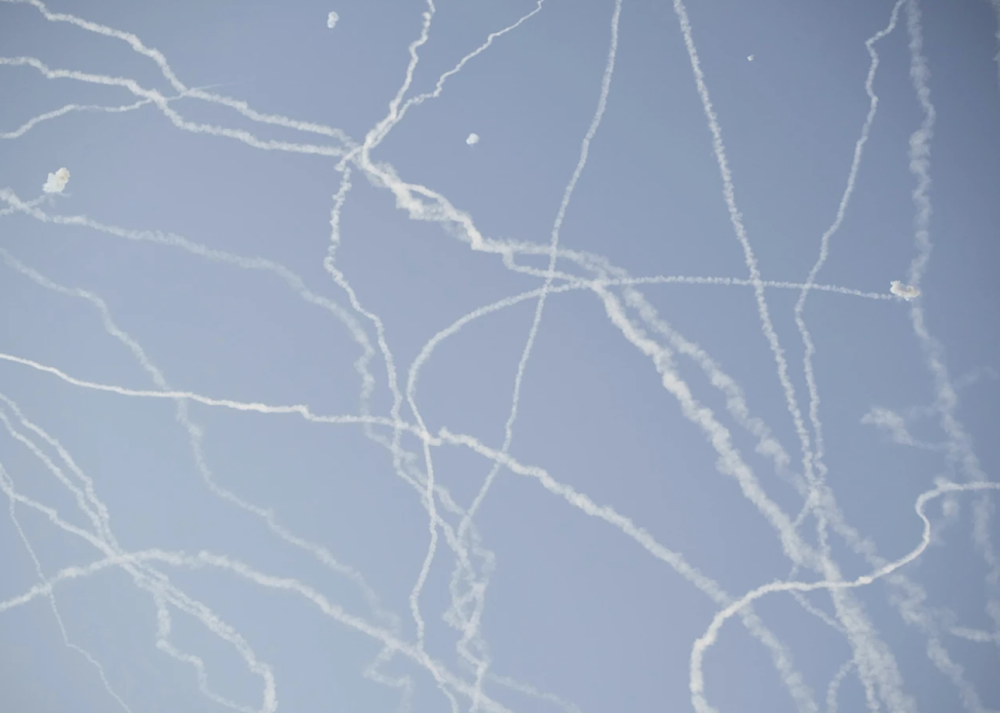Larijani says Iran to hold IAEA chief accountable after war ends
Ali Larijani, senior advisor to the Leader of Iran Sayyed Ali Khamenei, emphasizes that while the Israeli occupation began the war, ending it will require wisdom and resolve.
-

Israeli air defense systems fire to intercept missiles during an Iranian attack over Tel Aviv on June 19, 2025 (AP)
Resistance is the key to swiftly ending the war imposed on Iran by the Israeli entity, Ali Larijani, senior advisor to the Leader of Iran, Sayyed Ali Khamenei, emphasized on Thursday.
In a televised interview, Larijani stated that Iran’s perseverance will accelerate the end of the Israeli aggression, warning that any wavering in resistance could prolong the war, leading either to a loss of national dignity or increased suffering.
No one wants a long war, he said, adding that while the war began due to an unwise move by the opposing side, ending it will require wisdom and resolve.
Larijani stressed that steadfast resistance can "force the enemy to retreat," whereas a lack of it will only invite more pressure.
“Today is the day that determines the fate," he concluded, adding that "resistance can change the future of the region. Such perseverance has materialized in the outlook of many ethnicities and faiths."
He stressed the importance of nationwide support for Iran’s Armed Forces, stating, “If Israel feels weakness, it will instantly go for negotiations, because it is a flimsy regime and is grappling with internal problems at present.”
Larijani declared that Iran would hold IAEA Director General Rafael Grossi accountable “after the war ends,” sharply criticizing the agency’s role amid the ongoing war.
His remarks echoed those of Foreign Ministry spokesperson Esmaeil Baghaei, who earlier accused Grossi of enabling a Western-led campaign against Iran through what he called “biased” nuclear oversight. Baghaei argued that Grossi’s reports had been weaponized by the US and the E3 to legitimize an illegal act of war by a “genocidal, warmongering regime.”
Larijani also addressed the collapse of diplomacy, asserting that “the sixth round of talks was supposed to take place, but Trump pulled a trick in coordination with Israel.
While emphasizing that Iran does not seek war, he described the current moment as one requiring unwavering resolve.
“We must resist, confront the aggressors, and punish them," Larijani said, calling for national unity and resilience in the face of foreign aggression.
Pressure to destabilize Iran from within failed
Mocking the enemy’s miscalculation that external pressure might destabilize Iran from within, Larijani announced the failure of such efforts. Instead, a unified stance has emerged, according to Larijani, with all major political factions in Iran, even some opposition voices abroad, rallying behind the military in defense of the homeland.
He praised the Iranian public for their resilience, awareness, and steadfastness in the face of Israeli airstrikes, adding that the people's support for the Armed Forces has shifted the strategic balance in Iran’s favor.
"Israel" launched an unprovoked assault on June 13, targeting Iranian nuclear, military, and residential areas. The strikes claimed the lives of numerous senior military commanders, nuclear scientists, and civilians.
In response, Iran’s military quickly launched counterattacks. As of June 19, the Islamic Revolution Guards Corps Aerospace Force has carried out 15 waves of retaliatory missile strikes under Operation True Promise 3.
'Israel' is firing interceptors faster than it can produce them: NYT
Beyond the potential game-changing impact of a US military intervention, two key factors will likely determine the duration of the Israeli war on Iran: the number of long-range missiles Iran possesses and "Israel’s" stockpile of interceptors, The New York Times reported.
According to the American daily newspaper, "Israel" is depleting its interceptors faster than it can produce them, prompting growing concern within the Israeli security establishment. According to eight current and former officials, there is rising anxiety over whether "Israel’s" supply of air defense missiles will run out before Iran exhausts its missiles.
Already, the Israeli military has begun prioritizing the protection of densely populated areas and critical infrastructure, according to those officials, most of whom spoke on condition of anonymity.
“Interceptors aren’t grains of rice,” said Brig. Gen. Ran Kochav, a former commander of "Israel’s" air defense and a current military reservist. “The number is finite.” Conserving interceptors is a "challenge", he divulged.
As Iran continues to strike inside occupied territories, "Israel" is rapidly depleting its air defense resources. By Wednesday morning, Iran had launched approximately 400 missiles, of which around 40 penetrated Israeli defenses and struck targets, the NYT claimed.
Since multiple interceptors may have targeted some missiles, the total number used remains unknown. Israeli officials have declined to reveal how many interceptors remain, citing national security concerns.
This attritional missile exchange is testing both sides’ endurance. "Israel’s" capacity to sustain a prolonged war could hinge not only on interceptor reserves but also on whether President Trump chooses to escalate the war by attacking Iran’s Fordow nuclear site, or whether Iran halts enrichment to avoid US involvement.

 5 Min Read
5 Min Read










